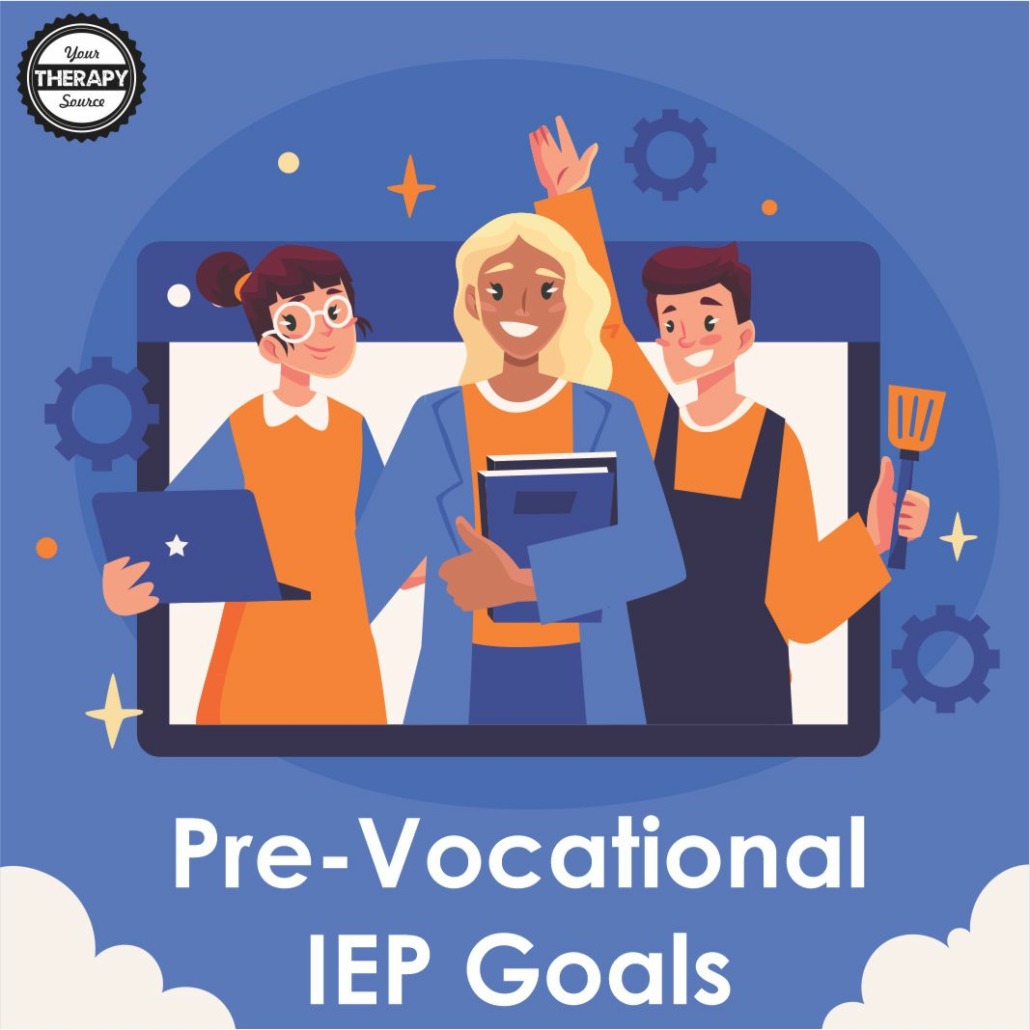Prevocational IEP Goals
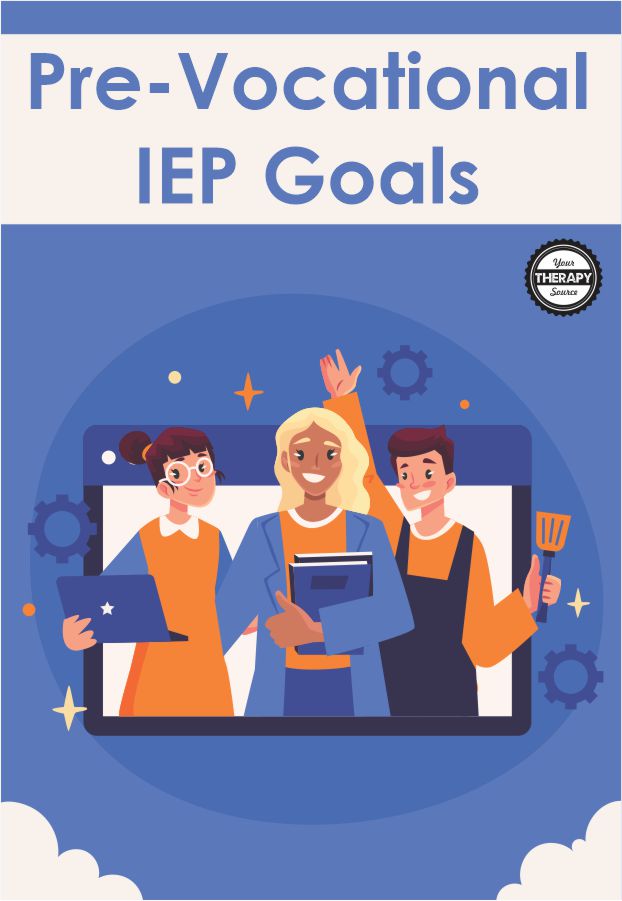
The transition from school to the world of work can be a daunting one, especially for special education students. One way to ensure this transition is smooth is by implementing prevocational IEP goals. These goals serve as the bridge between school life and a student’s future vocational pursuits.
WHAT ARE PREVOCATIONAL SKILLS?
Prevocational skills are critical in preparing individuals, especially those with special needs, for more specific vocational training and employment. Before diving into specific IEP goals, it’s essential to understand the categories of pre-vocational skills. These foundational skills prepare individuals for vocational training and the working world. Here’s a list of categories for pre-vocational skills:
- Work Habits and Behavior:
- Punctuality and attendance
- Dressing appropriately for work
- Following routines and schedules
- Responding to supervision
- Social Skills:
- Interpersonal communication
- Teamwork and collaboration
- Conflict resolution
- Accepting feedback
- Task Management:
- Following multi-step instructions
- Task completion within a given time frame
- Organizing work tasks
- Prioritizing assignments
- Problem-Solving Skills:
- Identifying issues
- Seeking help when needed
- Using appropriate strategies to address challenges
- Fine and Gross Motor Skills:
- Hand-eye coordination tasks
- Using tools or equipment safely
- Manual dexterity exercises
- Safety Awareness:
- Recognizing potential hazards
- Using equipment safely
- Following safety procedures and protocols
- Basic Academic Skills:
- Reading and understanding work-related texts
- Simple math for tasks like counting or measuring
- Writing or inputting data
- Self-Advocacy and Self-Awareness:
- Understanding one’s own strengths and areas of improvement
- Communicating personal needs
- Setting and working towards personal goals
- Time Management:
- Estimating time needed for tasks
- Using calendars or planners
- Pacing oneself to avoid fatigue
- Organizational Skills:
- Maintaining a clean and orderly workspace
- Organizing materials or tools
- Planning and sequencing tasks. Using graphic organziers.
- Basic Technology Skills:
- Using basic software applications
- Operating simple machines or devices
- Understanding the basics of Internet navigation
- Self-Care and Hygiene:
- Maintaining personal cleanliness
- Understanding the importance of grooming for work
- Adaptability and Flexibility:
- Adjusting to changes in routines or tasks
- Showing resilience in the face of challenges
- Attention to Detail:
- Checking work for errors
- Completing tasks accurately and thoroughly
- Money Management Basics:
- Identifying currency
- Making simple transactions
- Budgeting basics
Pre-vocational skills are foundational and provide individuals with the necessary tools to navigate more specific job training or employment scenarios successfully. Training in these areas can significantly improve the chances of a smooth transition into the workforce for those with or without special needs.
PREVOCATIONAL IEP GOALS – EXAMPLES
As students with special needs transition from high school to the broader world, preparing them for the workforce becomes a paramount concern. One critical aspect of this preparation revolves around prevocational IEP goals. These goals are not just about job-specific skills, but about laying a solid foundation that enables students to function effectively and independently in any vocational setting they choose. With the right set of skills, these students can confidently navigate the challenges of the workplace and lead productive lives. In this section, we’ll delve into various categories of pre-vocational skills and provide actionable, SMART IEP goal examples for each to guide educators, parents, and students in their journey toward vocational readiness.
WORK HABITS AND BEHAVIOR
- By the end of the semester, the student will demonstrate punctuality by arriving on time for class or work 95% of the time.
- Over a period of three months, the student will consistently dress appropriately for work tasks, receiving positive feedback from supervisors in 9 out of 10 instances.
- In six weeks, the student will be able to follow a given work routine without prompting for five consecutive days.
Read more about Behavior IEP goals here.
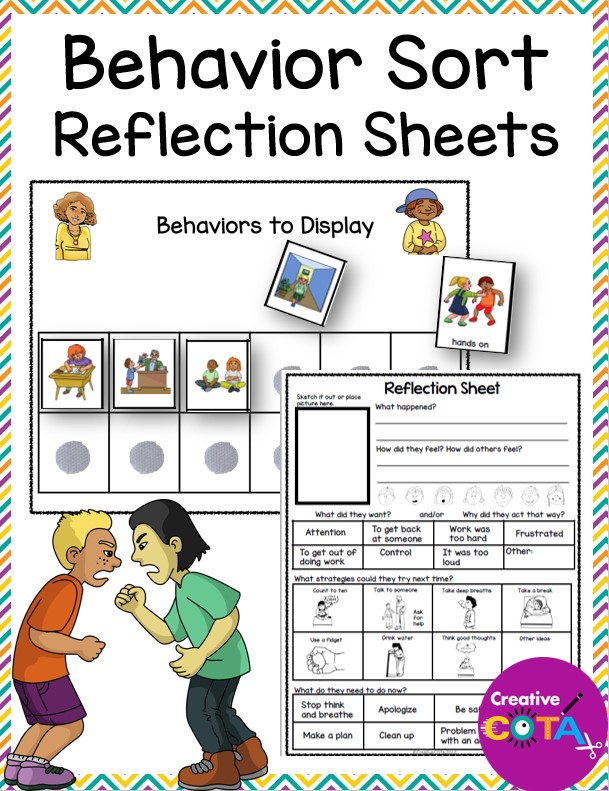
Reflection Sheet for Behavior – Social Emotional Learning
SOCIAL SKILLS PREVOCATIONAL IEP GOALS
- By the end of the school year, the student will effectively collaborate with peers in group projects, as observed by the teacher, in 4 out of 5 opportunities.
- The student will use conflict resolution strategies in 90% of disagreements or conflicts over a period of 8 weeks.
- Within a three-month period, the student will accept and incorporate feedback without displaying defensive behaviors in 8 out of 10 instances.
TASK MANAGEMENT
- For the next quarter, the student will follow multi-step instructions to complete tasks with 90% accuracy on all assignments.
- In the next 60 days, the student will demonstrate the ability to complete 80% of given tasks within the provided time frames.
- Over three months, the student will correctly prioritize and complete assignments in 9 out of 10 opportunities.
PROBLEM-SOLVING SKILLS
- By the end of the semester, the student will identify and address issues in their work on 85% of assignments.
- In 8 out of 10 opportunities, the student will seek help from appropriate resources when faced with a task-related problem over the next two months.
- The student will demonstrate the use of at least three different problem-solving strategies by the end of the school year.
FINE AND GROSS MOTOR SKILLS
- Over the next quarter, the student will achieve 90% accuracy in hand-eye coordination tasks relevant to their vocational goal.
- The student will safely use tools or equipment related to their desired vocation in 95% of all trials over the next 6 weeks.
- By the end of the school year, the student will improve manual dexterity to complete specific tasks with 85% accuracy.
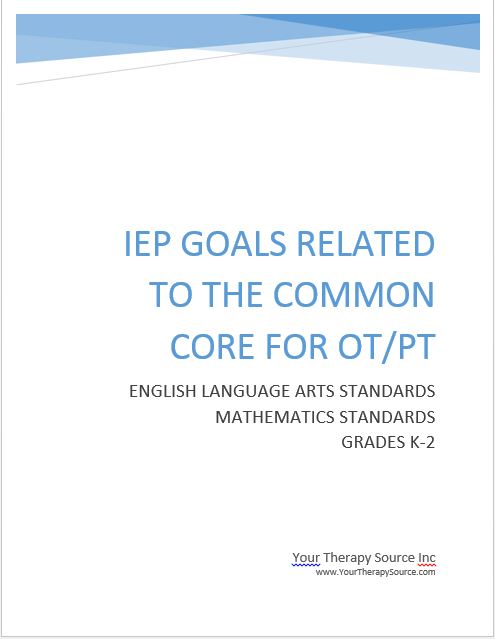
IEP Goals Related to the Common Core for OT/PT
SAFETY AWARENESS FOR PREVOCATIONAL IEP GOALS
- In the next three months, the student will correctly identify potential hazards in simulated work environments in 9 out of 10 scenarios.
- The student will consistently follow established safety procedures in class or work settings for ten consecutive days.
- Over six weeks, the student will demonstrate the safe use of equipment in 95% of all trials.
BASIC ACADEMIC SKILLS
- By the end of the term, the student will read and comprehend work-related texts with 90% accuracy on quizzes and tests.
- Over a period of two months, the student will consistently perform simple math tasks related to their vocational goals with 92% accuracy.
- In 8 out of 10 opportunities, the student will produce clear and coherent written data or information relevant to a work task over the next quarter.
SELF-ADVOCACY AND SELF-AWARENESS
- Over the next semester, the student will communicate their strengths and areas of improvement in three class or work discussions.
- In 90% of instances over the next six weeks, the student will appropriately communicate personal needs when they arise.
- By the end of the school year, the student will set and track progress towards at least two personal goals related to their vocational aspirations.
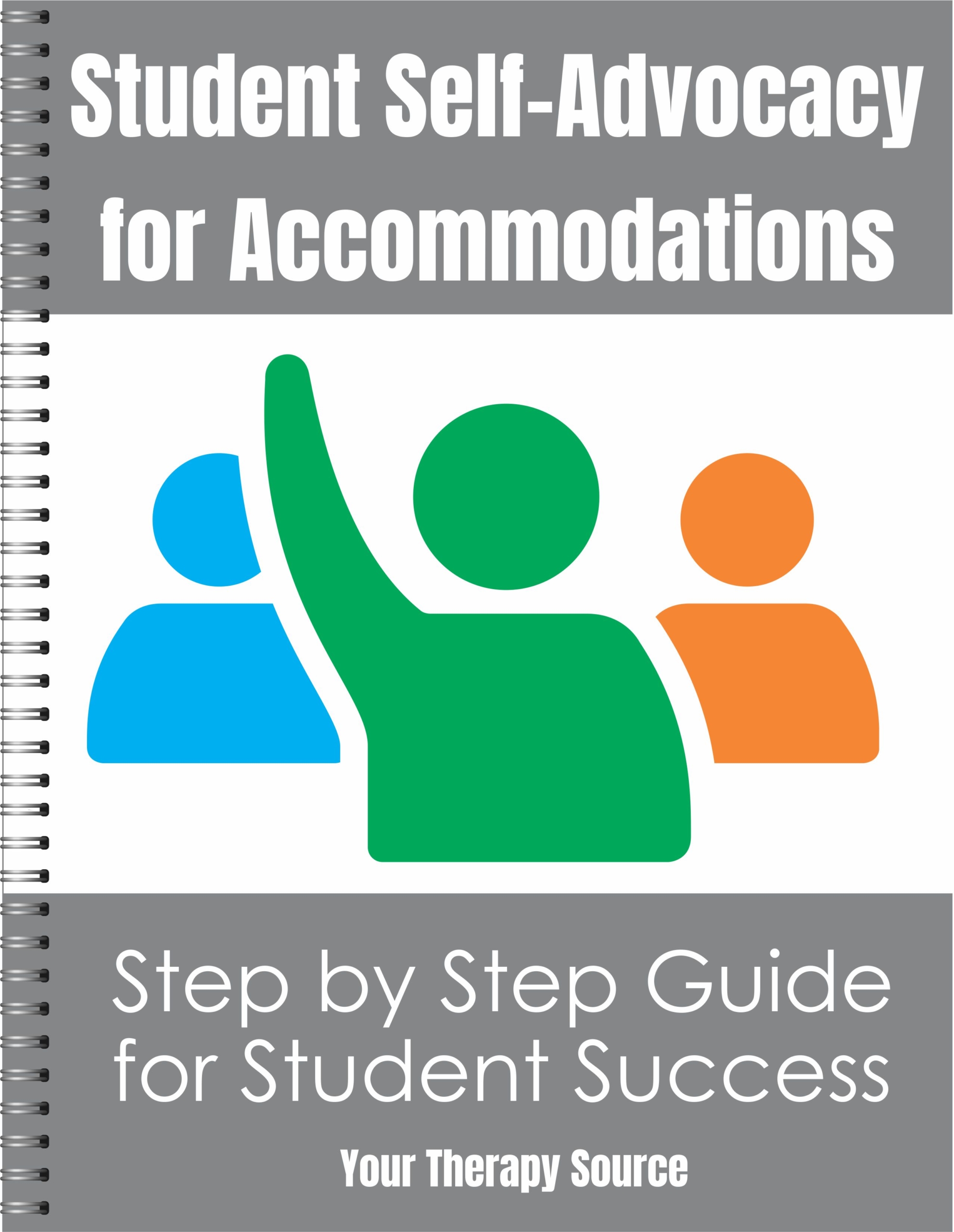
Self-Advocacy for Students
TIME MANAGEMENT
- Over the next 9 weeks, the student will correctly estimate the time needed for tasks and complete them within that timeframe in 8 out of 10 opportunities.
- For the following month, the student will use a planner or digital tool to track and manage assignments, resulting in no missed due dates.
- The student will break down larger projects into manageable tasks and sequence them appropriately in 4 out of 5 project-based assignments over the semester.
ORGANIZATIONAL SKILLS
- For ten consecutive school days, the student will maintain a clean and orderly workspace, as observed by the teacher.
- By the end of the quarter, the student will demonstrate the ability to organize materials or tools needed for tasks with 90% efficiency.
- In the next two months, the student will plan and sequence five different tasks without prompting.
BASIC TECHNOLOGY SKILLS FOR PREVOCATIONAL IEP GOALS
- Over the semester, the student will use basic software applications pertinent to their vocational goal with 90% proficiency in assignments.
- In the next 60 days, the student will operate three different types of machines or devices related to their vocational interest with 95% accuracy.
- The student will demonstrate an understanding of basic internet navigation to retrieve work-related information with 90% accuracy over the next quarter.
SELF-CARE AND HYGIENE
- By the end of the month, the student will consistently demonstrate personal cleanliness and grooming appropriate for a work setting on all school days.
- Over a two-month period, the student will identify and use three different strategies to maintain personal hygiene, as observed by caregivers or educators.
- In six weeks, the student will create and follow a personal hygiene routine, demonstrating all steps correctly in 9 out of 10 instances.
ADAPTABILITY AND FLEXIBILITY
- Over the next quarter, the student will adjust to at least three unexpected changes in routines or tasks without displaying negative behaviors.
- In 85% of new or unfamiliar situations over the semester, the student will demonstrate resilience and a positive approach.
- By the end of the school year, the student will employ two new strategies to cope with changes or unexpected challenges in class or work settings.
ATTENTION TO DETAIL
- Over the next two months, the student will check and correct errors in their work, achieving 90% accuracy on tasks that require precision.
- In 9 out of 10 opportunities, the student will demonstrate attention to detail by following all steps of a complex task without omission over the next quarter.
- For five consecutive weeks, the student will receive positive feedback on the thoroughness of their work from instructors or supervisors.
MONEY MANAGEMENT BASICS
- By the end of the next semester, the student will correctly identify all denominations of currency and make simple transactions with 95% accuracy.
- Over a period of six weeks, the student will budget a given amount of money, making purchasing decisions within the budget in 4 out of 5 scenarios.
- In the next 8 weeks, the student will demonstrate the ability to calculate correct change from purchases in 9 out of 10 trials.
With these SMART goals in place, educators, caregivers, and students can have a clearer path toward mastering pre-vocational skills essential for future employment and independent living. For a deeper dive into different types of IEP goals, you might want to check out self-regulation IEP goals and self-advocacy IEP goals.
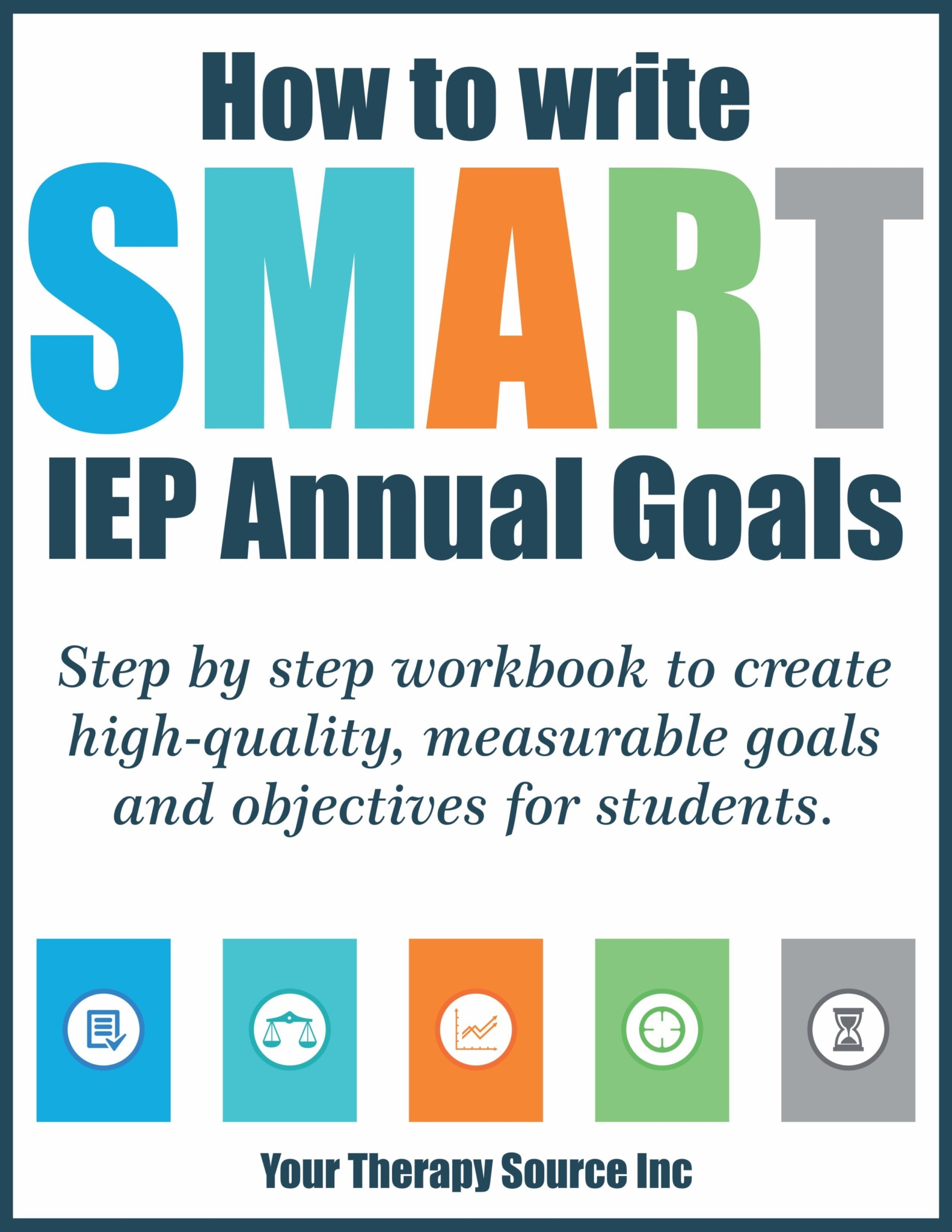
How to Write IEP Goals Workbook
WHAT IS THE DIFFERENCE BETWEEN PREVOCATIONAL AND VOCATIONAL SKILLS?
Understanding the distinction between prevocational and vocational skills is crucial in the context of special education and transitional planning. Here’s a breakdown of their differences:
Prevocational Skills:
- Definition: These are foundational skills that prepare an individual for the world of work but are not specific to any one job. They encompass a broad range of abilities and behaviors that are essential for success in various vocational settings.
- Examples: Some of these skills include time management, basic money handling, interpersonal communication, task organization, and safety awareness. These skills also cover self-advocacy, problem-solving abilities, and understanding work routines.
- Purpose: The main goal of prevocational skills is to ensure individuals are work-ready. They lay the groundwork and are often the first step in preparing special needs students for vocational training or employment.
Vocational Skills:
- Definition: These are job-specific skills related to a particular profession or career path. Vocational skills are typically more technical and specialized than prevocational skills.
- Examples: These could range from skills like coding for a software developer, culinary techniques for a chef, or mechanical knowledge for an auto technician. They are directly aligned with the requirements of a specific job or career.
- Purpose: The primary aim of vocational skills training is to equip individuals with the specialized abilities they need to perform a particular job effectively. Once an individual has the foundational prevocational skills in place, they can then move on to acquiring the vocational skills related to their chosen profession.
In summary, while prevocational skills serve as a general preparation for the work environment, vocational skills are the specialized abilities one needs to excel in a particular job or career. Both are essential in their own right, with prevocational skills typically being acquired before the more job-specific vocational skills.
WHAT IS A VOCATIONAL GOAL?
A vocational goal refers to a targeted outcome that a student aims to achieve in their post-high school work life. It’s a specific, measurable goal statement that relates to a student’s anticipated employment. Examples might include:
- “The student will learn to operate a cash register, ensuring that the gross pay matches the end-of-day tally with a 95% accuracy rate.”
- “By the end of the high school year, the student will demonstrate the ability to maintain a workstation, ensuring all tools are in their designated places at the end of each work task.”
The IEP team, which comprises educators, parents, and sometimes the student themselves, collaborates to ensure that the vocational goal aligns with the student’s abilities and interests. It’s all about paving a clear path from high school to the world of work, making sure that special needs students have the support and structure they need.
Furthermore, the IEP transition goals are designed to help special education students make the transition from school to postsecondary goals, whether that’s work, further education, or independent living.
CONCLUSION ON PREVOCATIONAL IEP GOALS
Prevocational IEP goals play a critical role in bridging the gap between school and employment for special education students. By providing a structured pathway, focusing on foundational and important life skills, and addressing individual needs, these goals ensure that every student is better prepared for their post-high school journey. Whether mastering an independent living goal or learning the intricacies of a specific job skill, these objectives are a great way to usher students into a bright future.
